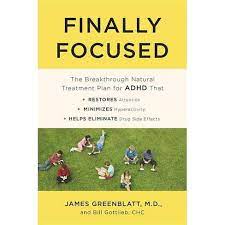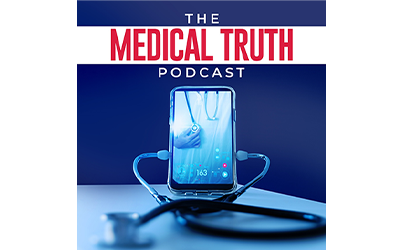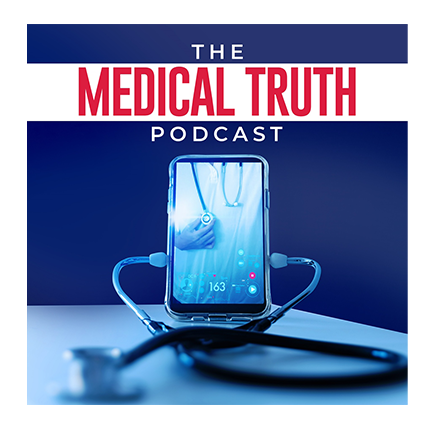Treating ADHD Naturally- Interview With James Greenblatt, M.D.

According to the CDC it is estimated that 6 million children between the ages of 3-17 years old were diagnosed with ADHD using data from 2016-2019. Of the 6 million children 63% received prescription medication; primarily stimulants or amphetamine derived substances such as Adderall, Ritalin or Vyvanse. The side affects from these medications are not very favorable in the short term and long term. Listen to this episode of the Medical Truth Podcast as host James Egidio interviews James Greenblatt, M.D. a world renowned pediatric psychiatrist who has dedicated his life and medical career to treating ADHD with a little known natural supplement. For previous and current podcast episodes as well as show transcripts go to www.MedicalTruthPodcast.com
Video & Transcript Below

Meet The Host
Episode Transcript
James Egidio:
Hi, I’m James Egidio, your host, the Medical Truth Podcast. The podcast that tells the truth, the whole truth, and nothing but the truth about the American healthcare system. According to the CDC, it is estimated that 6 million children between the ages of 3 and 17 years old were diagnosed with ADHD using data from 2016 through 2019. Of the 6 million children, 63% received prescription medication, primarily stimulants or amphetamine derived substances such as Adderall and Ritalin. My guest is recognized as a prominent authority on improving mental health outcomes by augmenting traditional psycho pharmacological medications and psychotherapy with nutritional medicine and metabolic interventions. As a health system leader, he served for 19 years as Chief Medical Officer and Vice President Medical Services for Walden Behavioral Health. He received his medical degree and completed his adult Psychiatry residency at George Washington University in Washington, D.C. as well as completed fellowship in child and adolescent psychiatry at John Hopkins Medical School. He currently served as an assistant clinical professor, psychiatry at Tufts University School of Medicine and Dartmouth College, Geisel School of Medicine. He is a sought after speaker for major behavioral health conferences around the world and the author of seven books, including Finally Focused: The Breakthrough Natural Treatment plan for ADHD. It is my pleasure to introduce my guest, Dr. James Greenblatt. Hi Dr. Greenblatt. How are you doing?
James Greenblatt, M.D.:
Hi. Great to be with you today. Thank you.
James Egidio:
Thank you, sir. Thanks. So tell the listening and viewing audience a little bit about, Finally, Focused the Breakthrough Natural Treatment Plan for ADHD
James Greenblatt, M.D.:
Sure. As a child psychiatrist, I’ve been treating ADHD now for almost 30 years, and talking about many of the kind of nutritional interventions and metabolic of interventions in the book for that entire time. But it was only within the past kind of 10 years where the scientific research reported everything that we were saying, and that’s why we decided to write the book to help educate parents. and professionals on what we call an integrative medical model for the treatment of ADHD
James Egidio:
Okay. What are some of the short-term and long-term side effects of the traditional medications prescribed for ADHD in pediatric patients? Because you hear a lot of sentiment about them being amphetamine based medications and what not
James Greenblatt, M.D.:
yeah, they’re absolutely amphetamines and they’re they do work and that’s the good and the bad news. So the medications approved for the treatment of ADHD from young children to adults are stimulants and their amphetamine based. And they only work when someone’s taking the medication. So they’re just symptomatic improvement. And our goal in an integrative medicine program is to look at the underlying cause so the medications relieve the symptoms for a majority of kids, but it does nothing with what’s contributing to the ADHD symptoms. So as soon as they’re off the medicine, the symptoms return.
James Egidio:
So when you say integrative medicine tell the audience a little bit about the listening audience and the viewing audience a little bit about what you integrate with those traditional medications. for ADHD.
James Greenblatt, M.D.:
Sure. It’s quite a long list and every child is different. I think that my goal is to work with the parents and the child, and I’m not gonna withhold medicine if the child is suffering and needs it. But we try to look at underlying issues and many of those are nutritional deficiencies. Magnesium, a trace mineral being the most common that we see with ADHD Kids essential fatty acids. What we talk about what’s in fish oil, omega-3’s as well as kind of food allergies, food additives, problems with the gut, a genetic vulnerabilities, long list. And our job is to work with parents and pediatricians to work our way through that list of primarily nutritional deficiencies. that might be contributing to what we’re calling ADHD.
James Egidio:
Okay. And you mentioned the magnesium and it’s interesting because me personally in the last month serendipitously I, cause you know what, I’m gonna do a little research and I was in the nutritional supplement industry for a while, back in the late eighties, early nineties. I did a little research on magnesium and for sleep and restless sleep and I wanted a more deeper sleep. And I tried melatonin and some other supplements, and then I said let me try magnesium. And I can’t believe the effects of magnesium. It just like really calmed me down. It was like just had a real calming effect on me. Yeah, that’s wonderful that you’re integrating these natural supplements or natural supplements along with the pharmaceuticals. And that’s of course refreshing for, I’m sure a lot of parents out there listening and watching this plus, the fact they could get them over the counter when they need to get them. How much of an impact. or, actually let me go back a little bit. How much of a role does diet and food additives, things like dyes and pesticides in foods and processed foods play in pediatric ADHD?
James Greenblatt, M.D.:
Sure. In comparison to magnesium, which you mentioned in my experience treating thousands of kids, I would say over 90% benefit from magnesium. I don’t know that if there’s genetics, but clearly based on testing and clinical most children would benefit from magnesium and that’s why it’s the first chapter in the book. You don’t need to do any testing. When you mentioned food additives, food dyese. When I started, in the eighties there was the Feingold diet and food additives were a real concern for parents. but eventually scientists were able to do the research and found out there’s just a percentage, 8-10% of kids who have this genetic vulnerability to not process these food additives and dyes. And then they do have behavioral problems associated with them. So it’s not a hundred percent of kids with ADHD. You’re gonna remove food additives and diets and they’ll get better. But parents were right 30 years ago. There is a percentage of kids that you give these additives and dyes and the behavior will get worse.
James Egidio:
Yeah. Also, I believe I was reading as well something about some amino acid supplements as further replenishment of let’s say serotonin and dopamine in the brains. What’s your take on that as far as that
James Greenblatt, M.D.:
yeah, no, it’s really important part of. how we would assess and treat a child or it’s all with ADHD cuz the medications that we use, the stimulants that you mentioned, they tend to increase the neurotransmitters, dopamine, norepinephrine to improve tension of focus. So we can also affect these neurotransmitters, I supplemental amino acids. And for ADHD we typically might use amino acids like Tyrosine with Phenylalanine which would help the body make more dopamine. So that’s been an important part of the therapy as well. But it’s probably not gonna help some of the core symptoms of ADHD.
James Egidio:
Oh, okay.
James Greenblatt, M.D.:
But it will help sleep disturbances for short term because the vast majority of kids with ADHD do struggle with sleep. And as they get older through adolescence, their sleep disruption really impairs much of their performance in school.
James Egidio:
Yeah. So you do see a vast improvement. Actually, that’s gonna be one of my questions for you is what kind of results have you seen with the natural breakthrough treatment plan for.
James Greenblatt, M.D.:
My career is pretty much based on the, this work and training other doctors how to do it as well. And, if you don’t become rigid and say, my child’s never gonna take medicine, or My child is never gonna take a supplement, the integration of our medical model with these supplements all the time can improve behavior and help with side effects to the medicine. And for over 50%. I have found that it can completely eliminate the need for medication.
James Egidio:
Wow, that’s great. That’s awesome. Why magnesium?
James Greenblatt, M.D.:
I think lots of reasons. Magnesium is I think the most common deficiency in the United States because one, it’s not put back in the soils when we farm and two, the foods that are high magnesium are not part of our standard diet, a processed food. So it’s the kind of the whole grains and the leafy greens. And then I think probably the most important is stress. Magnesium is the first mineral we lose when we’re under stress. And you think about these ADHD kids, whether they’re doing well or school or not, they’re chronically under stress we just, our body, as cortisol goes up we deplete magnesium. So there are lots of reasons that this essential mineral is deficient. And as I said I find it the most efficient trace mineral in my practice. Breeding, all of childhood psychiatric illnesses, adhd, depression, or anxiety.
James Egidio:
Yeah. And it sounds like they’re all interrelated because you have someone who is deficient, let’s say in this magnesium because they’re not getting it from food sources and you have high levels of stress, which creates insomnia, which creates a cascading effect of other health related issues because these are all important. Sleep is important obviously, and it just leads to more pathology. It sounds like
James Greenblatt, M.D.:
Absolutely. I think some of the. Just a, from sleep hygiene to exercise, some basic lifestyle changes can affect and improve symptoms of ADHD for many kids. And the opposite is also true. A ultra processed diet, poor sleep, stress will just aggravate the symptoms.
James Egidio:
Yeah. How much of an impact does the overuse and addiction to online video games, social media and the internet have on ADHD in children, because you see a lot of this, a lot of, in fact my stepson plays a lot of video games and doesn’t get much sleep because of that. But how much of an impact do these environmental, I’ll call ’em environmental stimuli have on ADHD and are they related? I
James Greenblatt, M.D.:
think what we’re typically finding is that some of the ADHD kids are much more prone to being stuck on some of these video games. It captures their attention, it helps ’em focus. They’re usually pretty good at it. And so it’s often the ADHD is related to some of these kids that develop problems and hard to get off the games, but clearly our ability to monitor and help parents understand the role of everything from social media to video games is really important and is increasingly one affecting sleep, affecting other behaviors, but it kind of fuels some of the underlying problems with the ADHD kid who has trouble focusing on school and other kind of less exciting tasks.
James Egidio:
So it’s like the what, what came first? The chicken or the egg as far as do you see more addiction due to ADHD or is ADHD the cause of addiction or, I know, we’re, yeah.
James Greenblatt, M.D.:
I don’t think we have good research to support either, but I think. theories play a role. I think our ADHD kids are more impulsive and have trouble focusing. So anything that’s gonna capture their attention, they will sustain. And it certainly the attention span kinda dissipates pretty quickly. If someone is spending a lot of time, on video games when they try to shift to something that’s not as exciting
James Egidio:
OK,. What advice do you have for parents and their children when it comes to being diagnosed with a ADHD?
James Greenblatt, M.D.:
I think the most important thing I can share with parents after thousands and thousands of patients of many years is that it’s important to educate yourself on ADHD but don’t compare either supplements or drugs with your neighbor cuz every child is different when we look at a integrative approach, we might see one child that’s deficient in magnesium or vitamin D another child having, food allergies or responding to food additives. So keep the your child as unique, as the core path, as you explore, behavioral therapies that’ll help. Understanding that ADHD, I think, needs to be looked at as a disability. So the punishments have to be understood with somebody who doesn’t always understand consequences. So the real core concept is your child is unique and will need your help, and you have to explore with that child how to find the best.
James Egidio:
Yeah, so it’s a crawl before your walk approach is identifying the issue first through the symptoms that you lay out in your book and then going from there.
James Greenblatt, M.D.:
Absolutely. Yes.
James Egidio:
Yeah. In your book, your quoted as saying ADHD is not a behavioral problem or discipline problem. ADHD is a medical disorder in which genetic, neurological, nutritional and environmental factors imbalance the brain causing imbalance behavior in that statement which one? Genetic, Neurological, Nutritional, or Environmental has the biggest influence on ADHD as a whole? Which one has the biggest influence?
James Greenblatt, M.D.:
Yes. Like choosing your favorite child. I don’t think we can. I think it’s clearly a genetic vulnerability for most not all. And then, what is that interaction with the environment? And for, again, one child, it could be, a nutritional deficiency for another child, it could be stress. It could be elevations of copper in the water or lead. So it really it’s has to be seen as a combination of all these factors, both in your kind of diagnosis and treatment plan. But again, a genetic vulnerability with environmental risk factors that we can look for now and treat.
James Egidio:
Yeah. Excellent. My guest, Dr. James Greenblatt, the book is called The Breakthrough Natural Treatment Plan for ADHD you could find it on Amazon. You could also find it at MedicalTruthPodcast.com. There’ll be a link to his Amazon page. I really appreciate your time for spending and going over all this. It’s awesome. Thank you so much.
James Greenblatt, M.D.:
Thank you for having me. Good luck with the podcast.
James Egidio:
Thanks. Thank you. Thank you.





